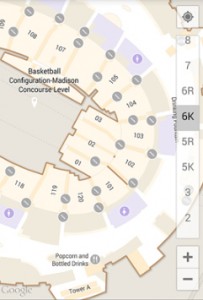Though Apple Inc.’s (AAPL) main maps application is still experiencing some difficulties despite dramatic efforts to catch up to competing services, the Cupertino company is planning to make use of iPhone’s tracking abilities and the iBeacon system to start an indoor mapping program. The fact that Apple is starting now already puts it firmly ahead of its primary rival, Google (GOOG), and the rest of the field, too.
Apple’s indoor maps have the potential to generate considerable revenue, since the large spaces likely to be included cover swaths of commercial property. Other indoor zones likely to be mapped as part of the program are sports arenas, public and other government buildings, museums, amusement parks, and so forth. Airports seem another likely target for mapping, though Apple’s (AAPL) representatives have not yet specifically mentioned them.
 The process of compiling these maps will be carried out partly through iPhones pinging iBeacons located in the spaces, plus other techniques. It is not yet clear if the data will be gathered by special scouts in the manner of Google Maps, or simply aggregated from the iPhone data of ordinary users. The latter seems likely, since the former method would be prohibitively expensive and would cover less territory in any case.
The process of compiling these maps will be carried out partly through iPhones pinging iBeacons located in the spaces, plus other techniques. It is not yet clear if the data will be gathered by special scouts in the manner of Google Maps, or simply aggregated from the iPhone data of ordinary users. The latter seems likely, since the former method would be prohibitively expensive and would cover less territory in any case.
Though store owners will likely opt in to the process and make the mapping function a reality, it is still uncertain how iPhone users will respond to the concept. The surveillance made possible by the system makes the measures used by the Soviet Union to spy on its citizens appear as crude as a hand-chipped flint axe by comparison. iBeacon readings could potentially place an individual in space with remarkable accuracy, including exact location and direction of movement in real time.
The one thing that seems to suggest the concept will not explode into a massive scandal is that people must deliberately opt into sending and receiving iBeacon data. It is easy to switch the Bluetooth “pinging” off, and will be even simpler with iOS 8. Thus, Apple (AAPL) can spy on people, but only with their conscious consent.
The paranoid, of course, will assume that Apple continues to monitor even once their iPhone’s iBeacon signals are switched off. Others may choose to switch off their devices, or continue to receive coupon offers and special discounts at the price of some additional lost privacy. Finally, it is not difficult to imagine that some workers may be required to keep their iPhones on while at the job, to ensure that they are not malingering near the water cooler.



